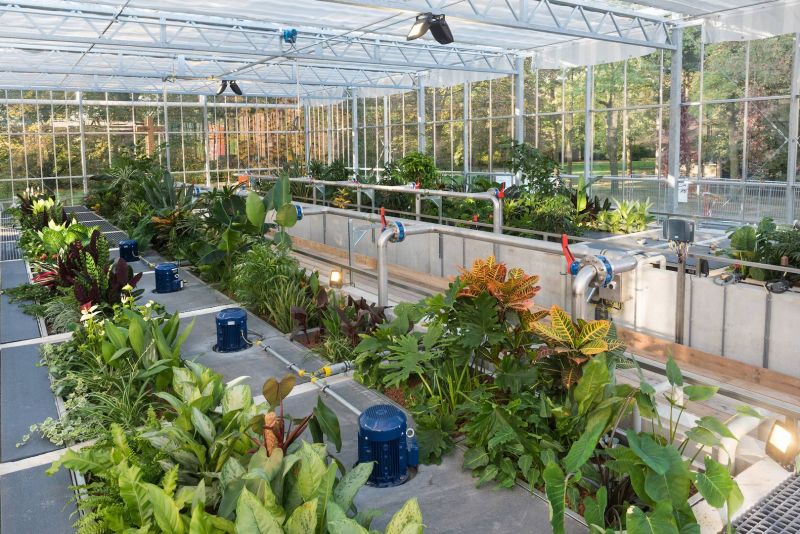Metabolic Hubs Join Forces to Provide Effective Water Systems for Urban Circularity (Case Study)
Published on by Water Network Research, Official research team of The Water Network in Case Studies
Overview
The Need: To help cities transition from their current linear system of consumption and waste, to a long-lasting and regenerative circular model.
The Solution: A decentralised network of BioMakeries ( urban metabolic hubs) that are powered by Biopolus MNR Technology to harness clean water, energy, nutrients, and minerals from wastewater and organic waste.
What makes this unique? Modular and fully integrated into the urban environment, BioMakeries treat and recycle wastewater, while also providing a platform for circular urban infrastructure integration, all with a beautiful garden aesthetic.
The result: Traditional large and smelly wastewater treatment facilities can be replaced by modular, compact, and odour-free BioMakeries, which free up valuable land for redevelopment, and create a platform where energy, food, and organic waste systems are built around a regenerative and sustainable water cycle.
A rapidly urbanised world
Water is essential for life, and as such, it is irreplaceable in the operation of all living systems, including cities. Therefore, urban circularity cannot be obtained without first achieving an effective water cycle, where residents and businesses have continuous access to safe clean water within the boundaries of their city. Using advanced biological engineering, Biopolus has created a modular, high-tech living system for complex circular urban water treatment and management.
Furthermore, the technology can also be used to recover valuable products - energy, nutrients, and minerals from organic waste. These solutions, along with additional available space for community functions and urban food production, can all be integrated and housed in the Biopolus BioMakery , creating a true hub for nature-based urban circularity.

Interior of a BioMakery (Source: Ellen MacArthur Foundation)
Advancements to a proven technology
Inventor, creative ecologist, and Biopolus founder, István Kenyeres has over 35 years of experience engineering ecosystems. István spent 15 of those years working to create a real breakthrough in wastewater treatment using the previous generation of his fixed film technology. Having successfully installed over 100 wastewater treatment facilities world-wide, István felt it was time to bring about the next paradigm shift, this time in the field of bio-economy.
In 2012, István, with greater knowledge and a new mission, along with technological and mechanical improvements to his fixed-film technology, launched Biopolus. The new objective was to create a 'BioMakery' for the future metropolis. The BioMakery , powered by Metabolic Network Reactor (MNR) technology, is a high tech living system which integrates infrastructure and technology with open innovation. It is a production platform that generates intermediary resources such as clean water, nutrients, minerals, and energy from wastewater and organic waste. These can be further processed to create valuable end products, helping to close and valorise urban organic waste loops.
What is MNR technology?
The Metabolic Network Reactor (MNR) technology is Biopolus’ patented water treatment technology. MNR is characterised by the large surface area of biomass, which covers plant roots and artificial carriers (or roots) to increase the diversity and the number of microbial species, for highly efficient organic waste biodegradation.
The full treatment process takes place in an array of reactors. As the water flows through, it is continually cleaned, as the specialised ecology of the different tanks break down different contaminants. The path and volumetric distribution of wastewater between the reactors is controlled by process management software and can dynamically adapt to the changing loads for process optimisation.
MNR technology is designed to be compact and modular, meaning it can be expanded and scaled to the desired size. The technology can also be arranged in a vertical or horizontal configuration allowing for maximum architectural flexibility. With its garden-like atmosphere and odor free nature, the BioMakery can be placed into any urban environment.
First European Facility operational
The first European BioMakery was completed in 2018, at the Koningshoeven Trappist Abbey and Brewery. The facility is fully integrated into the historical monument of the Abbey. The plant treats industrial wastewater from the brewery, and municipal wastewater from the Abbey and visitor centre to a high quality. The water is reused on-site for irrigation and local aquifer recharge. There are plans to later re-use the water at the brewery for bottle rinsing. Thermal energy is also recovered from the wastewater and used to heat the greenhouses.
The Koningshoeven BioMakery is also a testbed for innovation. The site is a NextGen H2020 large scale demo site for circularity, in which Biopolus is working with the European Space Agency, SEMiLLA, to improve advanced circular space technology within the MELiSSA program for water / nutrient recovery from wastewater and organic waste. In addition, Biopolus and the Dutch waterboard De Dommel, will study the distributed functions of decentralised water treatment facilities.
The BioMakery at Koningshoeven is important because it will serve as a replicable model for the next generation of wastewater treatment. The project is an example of how overburdened centralised wastewater management systems can be supplemented with decentralised facilities that can be fully integrated into their surrounding urban environment. As platforms for circular urban infrastructure, an interconnected network of BioMakeries can bring about a paradigm change in wastewater treatment, building a foundation for true water-based urban circularity.
Read more info on this case on the Ellen MacArthur Foundation website
Media
Taxonomy
- Treatment
- Biological Treatment
- Water Treatment & Control
- Urban Drainage
- Waste Water Treatments
- Technology
- Wastewater Treatment
- Water Treatment Solutions
- Integrated Urban Water Management
- Urban Water
- Urban Water Supply
- Urban Water Infrastructure
- Biotechnology
- Environment & Water
- Water sanitation
- Renewable Energy
- Bioenergy
- Bioenergy Technology
- Renewable Energy Power
- Water Purification
- Renewable Water Resources
- Circular Economy
- water packaged plants
- urban water security
- Packaged Water Treatment System
- Modular Plant
- water treatment